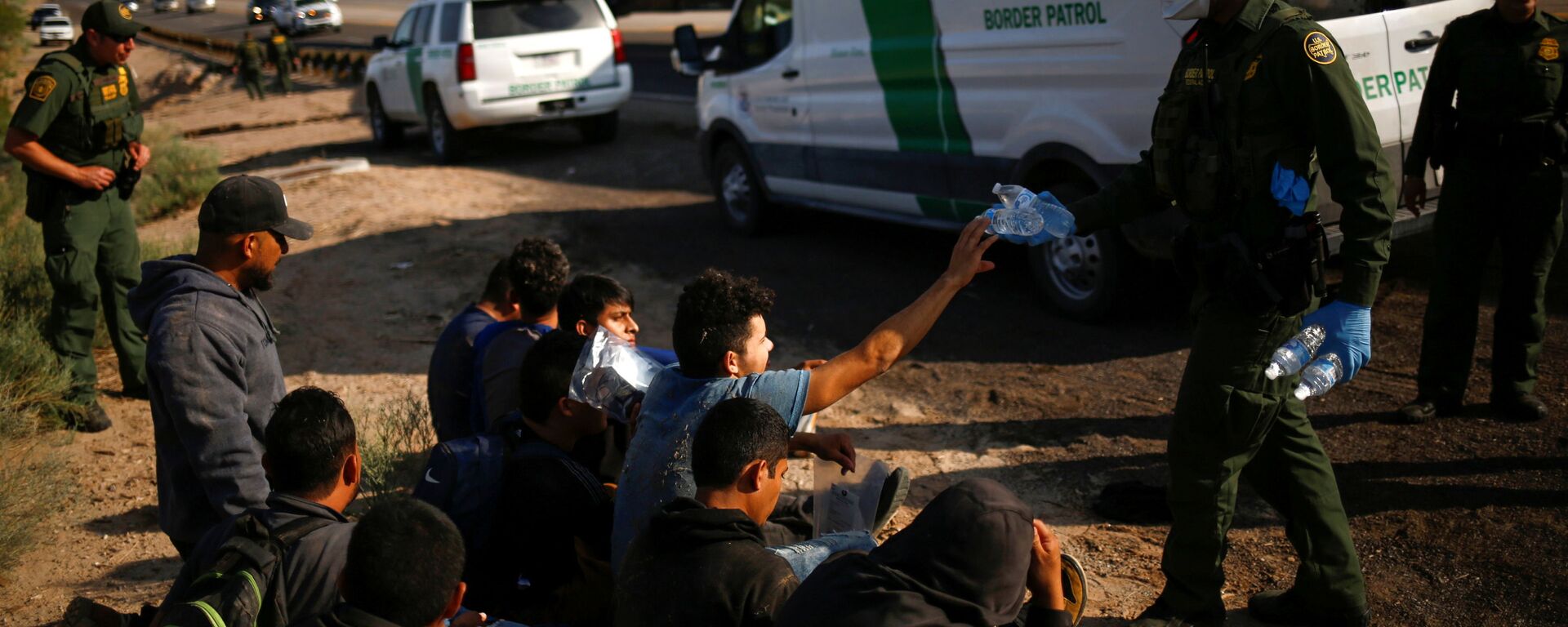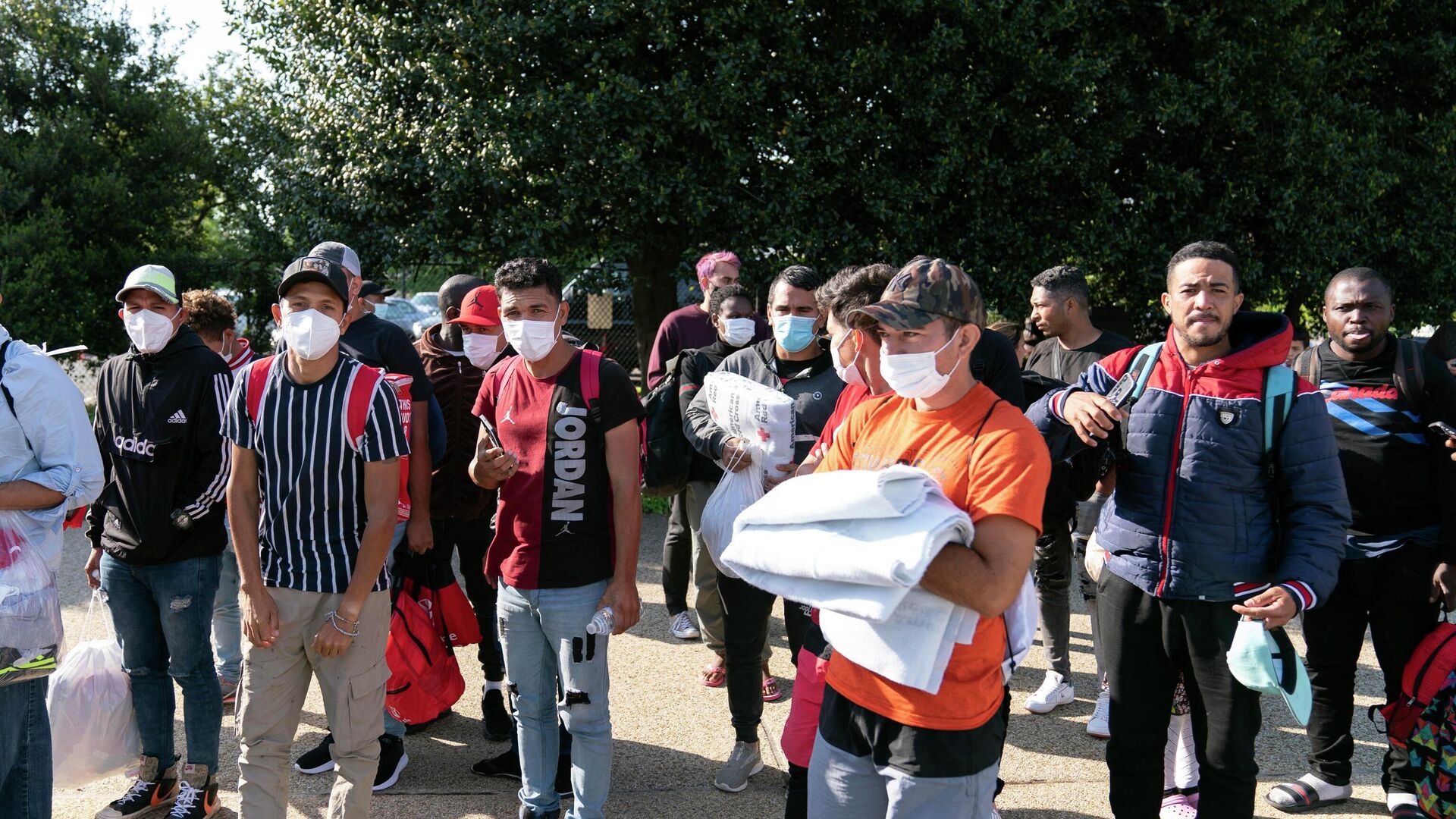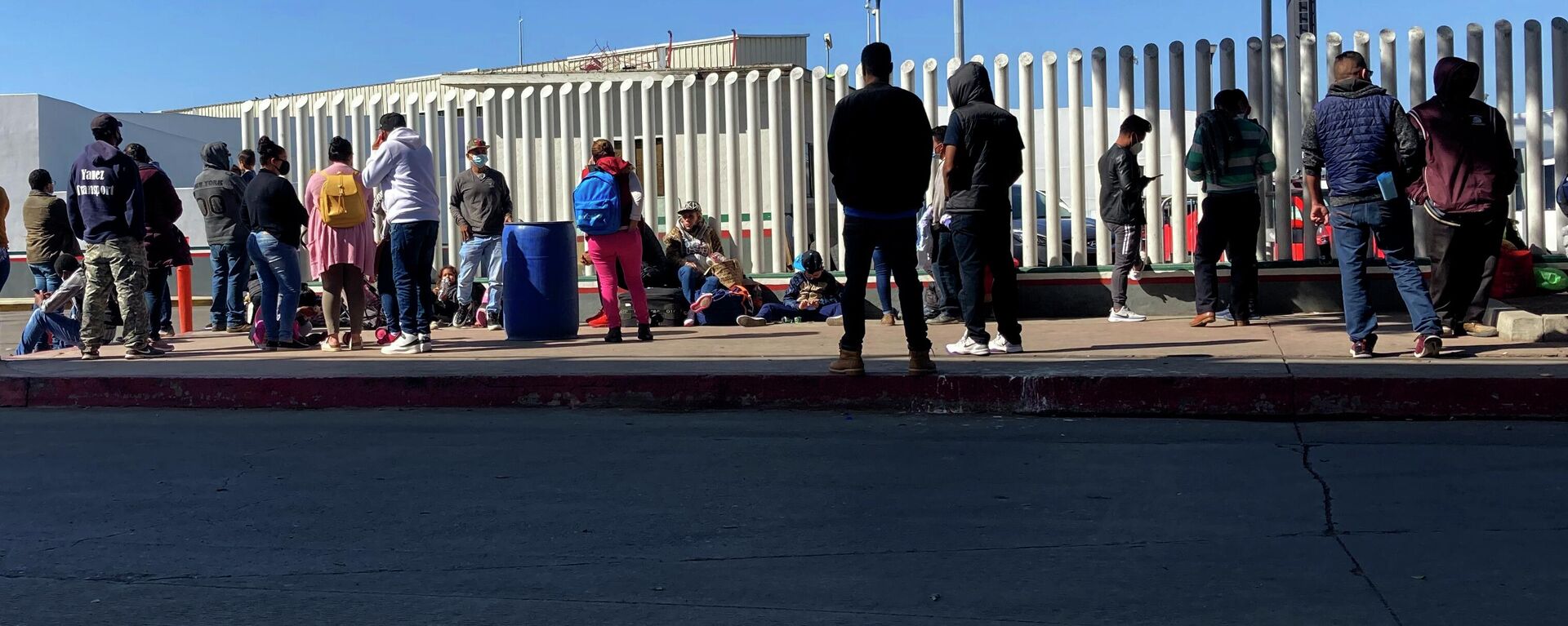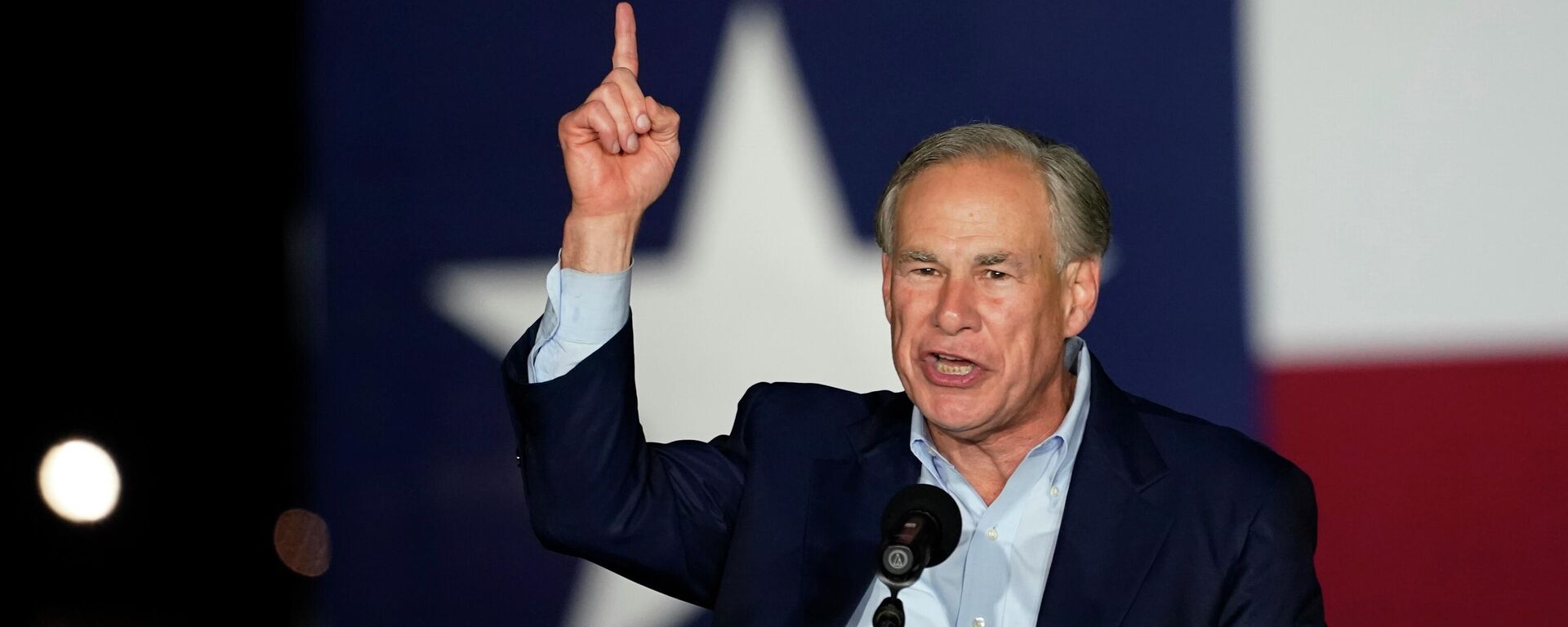https://sputnikglobe.com/20220513/communities-are-strapped-arizona-joins-texas-in-busing-asylum-seekers-from-us-mexico-border-to-dc-1095477869.html
‘Communities Are Strapped’: Arizona Joins Texas in Busing Asylum Seekers From US-Mexico Border to DC
‘Communities Are Strapped’: Arizona Joins Texas in Busing Asylum Seekers From US-Mexico Border to DC
Sputnik International
Arizona Gov. Doug Ducey (R) announced on Wednesday that the state has adopted a busing system to voluntarily transport asylum-seeking migrants from the... 13.05.2022, Sputnik International
2022-05-13T02:44+0000
2022-05-13T02:44+0000
2022-05-13T02:45+0000
us
us-mexico border
migrants
asylum seekers
texas
arizona
biden administration
gregg abbott
doug ducey
immigration
https://cdn1.img.sputnikglobe.com/img/07e6/05/0d/1095477725_0:0:3073:1728_1920x0_80_0_0_759c8b66319530ac77051721be7268d0.jpg
Arizona’s first bus transporting asylum-seeking migrants arrived in Washington, DC, on Wednesday–two days after it departed from Yuma, Arizona, according to the office of Arizona Gov. Doug Ducey.C.J. Karamargin, Ducey’s director of communications, asserted that all 20 individuals who volunteered for the 2,500-mile (~4,000-kilometer) journey were accounted for on Wednesday and were met by non-governmental organizations “that can help them get to their ultimate destinations.’’Travelers were said to have come from Angola, Columbia, Haiti, Peru, Venezuela and Uzbekistan, and are set to be united with sponsors in Pennsylvania, Florida, New York, New Jersey, Virginia and Maine.While it remains unclear how many asylum seekers will actually take advantage of the transportation system, Ducey’s government believes the decision is worth the extra cost.Arizona is presently capable of sending two to three buses a week, transporting up to 40 asylum-seekers on each. The total cost is dependent on the number of volunteers, the official pointed out.In March, the federal government earmarked some $150 million of the spending bill to be released to asylum-related nonprofits. A portion of the funds is intended to be used to arrange transportation for migrants needing transportation to their sponsors in the US.Despite the federal funds in circulation, both Arizona and Texas have decided to accelerate the process. Ducey’s effort is currently being funded by the Border Security Fund, coffers established in 2021 in partnership with the Arizona Legislature.Texas has assembled some 900 buses for its operation, per Texas Division of Emergency Management Chief Nim Kidd. Migrants “must volunteer to be transported and show documentation” from the Department of Homeland Security.Like Abbott, Ducey argued this week that the federal government has overwhelmed the state, as asylum seekers “are taxing the resources, stretching the resources of nongovernmental organizations, community-based organizations.”While it is unclear whether the Biden White House will actually pick up the bill for the border states’ busing programs, the administration appears supportive of states assisting in the asylum process, despite viewing it as an “unnecessary” move in the case of the Texas state authorities.However, “these actions are impacting people’s jobs and the livelihoods of hardworking families in Texas and across the country,” Psaki added.As the US grapples with a historic surge of migrant encounters at the US-Mexico border, the White House has announced it has begun moving US border personnel from northern to southern stations to assist with the influx. The DHS has acknowledged that the decision to not extend Title 42 could present “significant challenges” for the federal government.
https://sputnikglobe.com/20220424/texas-dem-says-bidens-title-42-repeal-will-be-exploited-by-criminal-orgs-near-us-mexico-border-1095020299.html
https://sputnikglobe.com/20220406/abbott-texas-to-begin-transporting-illegal-immigrants-to-us-capital-by-charter-bus-1094534918.html
https://sputnikglobe.com/20210813/leaked-audio-dhs-sec-warns-us-may-lose-southern-border-crisis-amid-influx-of-migrant-encounters-1083600173.html
texas
arizona
Sputnik International
feedback@sputniknews.com
+74956456601
MIA „Rossiya Segodnya“
2022
News
en_EN
Sputnik International
feedback@sputniknews.com
+74956456601
MIA „Rossiya Segodnya“
Sputnik International
feedback@sputniknews.com
+74956456601
MIA „Rossiya Segodnya“
us, us-mexico border, migrants, asylum seekers, texas, arizona, biden administration, gregg abbott, doug ducey, immigration
us, us-mexico border, migrants, asylum seekers, texas, arizona, biden administration, gregg abbott, doug ducey, immigration
‘Communities Are Strapped’: Arizona Joins Texas in Busing Asylum Seekers From US-Mexico Border to DC
02:44 GMT 13.05.2022 (Updated: 02:45 GMT 13.05.2022) Arizona Gov. Doug Ducey (R) announced on Wednesday that the state has adopted a busing system to voluntarily transport asylum-seeking migrants from the southern US border to Washington, DC. The move, first implemented by Texas Gov. Greg Abbott (R), comes in response to the CDC’s decision to end Title 42.
Arizona’s first bus transporting asylum-seeking migrants arrived in Washington, DC, on Wednesday–two days after it departed from Yuma, Arizona,
according to the office of Arizona Gov. Doug Ducey.
C.J. Karamargin, Ducey’s director of communications, asserted that all 20 individuals who volunteered for the 2,500-mile (~4,000-kilometer) journey were accounted for on Wednesday and were met by non-governmental organizations “that can help them get to their ultimate destinations.’’
Travelers were said to have come from Angola, Columbia, Haiti, Peru, Venezuela and Uzbekistan, and are set to be united with sponsors in Pennsylvania, Florida, New York, New Jersey, Virginia and Maine.
While it remains unclear how many asylum seekers will actually take advantage of the transportation system, Ducey’s government believes the decision is worth the extra cost.
“It pales in comparison to the stress on local resources,” Karamargin said, noting that the Biden administration will receive a final bill for the associated busing costs. “Our communities are strapped.”
Arizona is presently capable of sending two to three buses a week, transporting up to 40 asylum-seekers on each. The total cost is dependent on the number of volunteers, the official pointed out.
In March, the federal government earmarked some $150 million of the spending bill to be released to asylum-related nonprofits. A portion of the funds is intended to be used to arrange transportation for migrants needing transportation to their sponsors in the US.
Despite the federal funds in circulation, both Arizona and Texas have decided to accelerate the process. Ducey’s effort is currently being funded by the Border Security Fund, coffers established in 2021 in partnership with the Arizona Legislature.
“To help local officials whose communities are being overwhelmed by hordes of illegal immigrants who are being dropped off by the administration, Texas is providing charter buses to send these illegal immigrants who have been dropped off by the Biden Administration to Washington, DC,” Texas Gov. Greg Abbott announced last month during a news conference along the US-Mexico border.
Texas has assembled some 900 buses for its operation, per Texas Division of Emergency Management Chief Nim Kidd. Migrants “must volunteer to be transported and show documentation” from the Department of Homeland Security.
Like Abbott, Ducey argued this week that the federal government has overwhelmed the state, as asylum seekers “are taxing the resources, stretching the resources of nongovernmental organizations, community-based organizations.”
“And this situation will only get worse if Title 42 is lifted,” the Arizona governor said of the public health policy set to expire on May 23. “We decided to step up and help alleviate the burden on our NGOs and get these folks closer to where they ultimately want to be.”

13 August 2021, 20:02 GMT
While it is unclear whether the Biden White House will actually pick up the bill for the border states’ busing programs, the administration appears supportive of states assisting in the asylum process, despite viewing it as an “unnecessary” move in the case of the Texas state authorities.
“It’s nice the state of Texas is helping them get to their final destination, as they await their outcome of their immigration proceedings and they’re all in immigration proceedings,” said White House Press Secretary Jen Psaki last month, responding to Texas’ first bus.
However, “these actions are impacting people’s jobs and the livelihoods of hardworking families in Texas and across the country,” Psaki added.
As the US grapples with a
historic surge of migrant encounters at the US-Mexico border, the White House has announced it has begun moving US border personnel from northern to southern stations to assist with the influx.
The DHS has acknowledged that the decision to not extend Title 42 could present “significant challenges” for the federal government.



